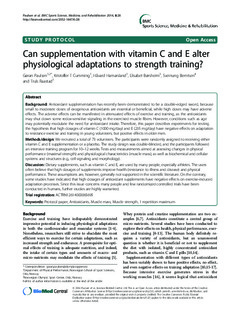| dc.contributor.author | Paulsen, Gøran | |
| dc.contributor.author | Cumming, Kristoffer T. | |
| dc.contributor.author | Hamarsland, Håvard | |
| dc.contributor.author | Børsheim, Elisabet | |
| dc.contributor.author | Berntsen, Sveinung | |
| dc.contributor.author | Raastad, Truls | |
| dc.date.accessioned | 2014-09-12T12:47:46Z | |
| dc.date.available | 2014-09-12T12:47:46Z | |
| dc.date.issued | 2014 | |
| dc.identifier.citation | Paulsen, G., Cumming, K. T., Hamarsland, H., Borsheim, E., Berntsen, S., & Raastad, T. (2014). Can supplementation with vitamin C and E alter physiological adaptations to strength training? BMC Sports Science, Medicine and Rehabilitation, 6(1), 28. doi: 10.1186/2052-1847-6-28 | nb_NO |
| dc.identifier.issn | 2052-1847 | |
| dc.identifier.uri | http://hdl.handle.net/11250/219647 | |
| dc.description | Published version of an article from the journal: BMC Sports Science, Medicine and Rehabilitation. Also available from the publisher: http://dx.doi.org/10.1186/2052-1847-6-28 | nb_NO |
| dc.description.abstract | Background: Antioxidant supplementation has recently been demonstrated to be a double-edged sword, because
small to moderate doses of exogenous antioxidants are essential or beneficial, while high doses may have adverse
effects. The adverse effects can be manifested in attenuated effects of exercise and training, as the antioxidants
may shut down some redox-sensitive signaling in the exercised muscle fibers. However, conditions such as age
may potentially modulate the need for antioxidant intake. Therefore, this paper describes experiments for testing
the hypothesis that high dosages of vitamin C (1000 mg/day) and E (235 mg/day) have negative effects on adaptation
to resistance exercise and training in young volunteers, but positive effects in older men.
Methods/design: We recruited a total of 73 volunteers. The participants were randomly assigned to receiving either
vitamin C and E supplementation or a placebo. The study design was double-blinded, and the participants followed
an intensive training program for 10–12 weeks. Tests and measurements aimed at assessing changes in physical
performance (maximal strength) and physiological characteristics (muscle mass), as well as biochemical and cellular
systems and structures (e.g., cell signaling and morphology).
Discussion: Dietary supplements, such as vitamin C and E, are used by many people, especially athletes. The users
often believe that high dosages of supplements improve health (resistance to illness and disease) and physical
performance. These assumptions are, however, generally not supported in the scientific literature. On the contrary,
some studies have indicated that high dosages of antioxidant supplements have negative effects on exercise-induced
adaptation processes. Since this issue concerns many people and few randomized controlled trials have been
conducted in humans, further studies are highly warranted.
Trial registration: ACTRN12614000065695 | nb_NO |
| dc.language.iso | eng | nb_NO |
| dc.publisher | Biomedcentral | nb_NO |
| dc.rights | Navngivelse 3.0 Norge | * |
| dc.rights.uri | http://creativecommons.org/licenses/by/3.0/no/ | * |
| dc.title | Can supplementation with vitamin C and E alter physiological adaptations to strength training? | nb_NO |
| dc.type | Journal article | nb_NO |
| dc.type | Peer reviewed | nb_NO |
| dc.subject.nsi | VDP::Medical disciplines: 700::Sports medicine: 850 | nb_NO |
| dc.source.pagenumber | 12 p. | nb_NO |
| dc.source.volume | 6 | nb_NO |
| dc.source.journal | BMC Sports Science, Medicine and Rehabilitation | nb_NO |
| dc.source.issue | 1 | nb_NO |
| dc.identifier.doi | 10.1186/2052-1847-6-28 | |

